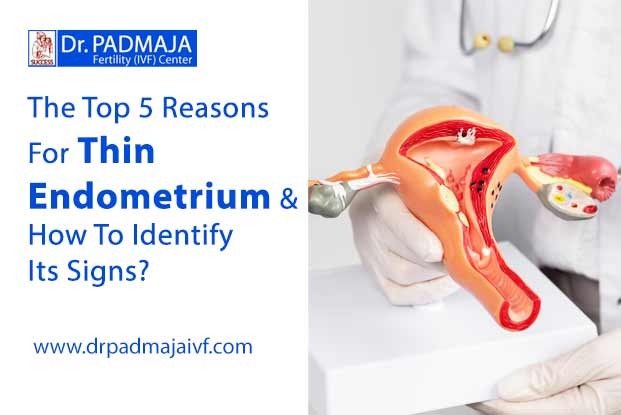Endometrial health plays a crucial role in a woman’s fertility. A thin endometrium, or thin uterine lining, can be one of the significant obstacles for women trying to conceive, especially for those undergoing assisted reproductive technologies like IVF. If the lining of the uterus is too thin, it can prevent an embryo from implanting, reducing the chances of a successful pregnancy. In this blog, we will explore the top 5 reasons for a thin endometrium and how to identify its signs, helping you make informed decisions about your fertility journey. If you’re seeking expert care, the best IVF center in Hyderabad, such as Dr. Padmaja IVF Center, offers specialized treatments to address endometrial issues.
1. Hormonal Imbalance
One of the most common causes of a thin endometrium is a hormonal imbalance, particularly an insufficient amount of estrogen.During the menstrual cycle, estrogen is in charge of thickening the uterine lining. If there isn’t enough estrogen in the body, the uterine lining may remain thin, which can be detrimental for implantation during IVF or natural conception.
Signs to Look For:
Irregular or absent periods
Hot flashes or night sweats (signs of hormonal fluctuations)
Difficulty conceiving
At Dr. Padmaja Fertility Center, specialized treatments can help regulate hormonal imbalances and improve endometrial thickness. A thorough examination and customized treatment plans are essential to address these issues effectively.
2. Poor Blood Flow to the Uterus
Inadequate blood flow to the uterus can prevent the endometrial lining from thickening properly. Conditions like hypertension, diabetes, or certain lifestyle factors can impair circulation. Poor blood flow means less oxygen and fewer nutrients reach the endometrium, affecting its ability to grow.
Signs to Look For:
Painful periods or cramps
Recurrent miscarriages or failed IVF cycles
General poor health or chronic conditions affecting circulation
Improving circulation to the uterus is key, and medical professionals at the best IVF center in Hyderabad, such as Dr. Padmaja IVF Center, can offer treatments that promote uterine health, including medication or even lifestyle changes.
3. Uterine Abnormalities or Scarring (Asherman’s Syndrome)
Sometimes, previous surgeries, such as dilation and curettage (D&C) or uterine infections, can cause scarring inside the uterus. This condition, known as Asherman’s Syndrome, can lead to a thin endometrial lining. Scarring restricts the growth of the uterine lining and affects its ability to support an embryo.
Signs to Look For:
Infertility or difficulty getting pregnant
Painful intercourse or abnormal bleeding
History of uterine surgeries or infections
If you suspect uterine scarring, seeking expert consultation at Drpadmaja Fertility Center can help. Advanced diagnostic techniques like hysteroscopy are used to detect and treat uterine abnormalities effectively.
4. Age-Related Factors
A woman’s hormone production and ovarian reserve naturally decrease with age. The endometrial lining may become thinner as a result. Women over the age of 35, especially those undergoing IVF, may struggle with a thin endometrium due to reduced estrogen production and poor egg quality.
Signs to Look For:
Difficulty getting pregnant despite trying
Menstrual irregularities
A history of unsuccessful IVF cycles
At Dr. Padmaja IVF Center, fertility specialists offer personalized care to older women, utilizing advanced techniques to enhance endometrial health and optimize chances for successful conception.
5. Certain Medications
Some medications can have side effects that impact the uterine lining. For instance, prolonged use of medications like GnRH agonists (used in IVF treatment), or steroids, can interfere with estrogen levels and result in a thinner endometrium. It’s essential to discuss any ongoing medications with your fertility specialist.
Signs to Look For:
Changes in menstrual cycles after starting new medication
Difficulty conceiving after starting fertility treatments
Weight gain, mood changes, or other side effects from medications
If you suspect that your medication might be contributing to a thin endometrium, consult with experts at the best IVF center in Hyderabad for guidance on managing medication while protecting your fertility.
Conclusion
A thin endometrium can be a challenging condition, but it’s important to remember that it is treatable. Identifying the cause of the thin uterine lining is the first step in finding the appropriate solution. If you’re struggling with fertility and suspect a thin endometrium, visiting a renowned clinic like Dr. Padmaja IVF Center can provide you with the care you need. By addressing underlying causes such as hormonal imbalances, uterine abnormalities, or poor blood flow, you can significantly improve your chances of a successful pregnancy. If you’re looking for expert care, don’t hesitate to reach out to Drpadmaja Fertility Center to explore treatment options and take the next step in your fertility journey.
About The Author :

If Dr. Padmaja Divakar is a public figure or a professional in a specific field, I recommend checking her official website, professional profiles, or reliable online sources for the most up-to-date and accurate information about her background, qualifications, and achievements.
Frequently Asked Questions (faqs)
1.What is considered an optimal endometrial thickness for pregnancy?
Generally, an endometrial thickness of 8–12 mm is considered ideal for embryo implantation. Thickness below 7 mm may reduce the chances of successful pregnancy.
2.Can a thin endometrium be treated?
Yes, treatments may include hormonal therapies, such as estrogen supplements, to promote endometrial growth. Other methods, like lifestyle changes, acupuncture, and certain supplements, may help improve blood flow to the uterus.
3.Does a thin endometrium cause infertility?
It can contribute to infertility since a thinner lining may make it harder for an embryo to implant. However, it is one of several factors affecting fertility, and some women with a thin endometrium still achieve successful pregnancies.
4.Are there natural ways to thicken the endometrial lining?
Certain lifestyle changes (like exercise and a healthy diet) and natural supplements (such as vitamin E and L-arginine) may help improve blood flow and endometrial thickness. However, it’s essential to consult with a healthcare provider before trying supplements.
5.Is a thin endometrium always a concern?
Not always. Some women naturally have a slightly thinner endometrial lining but still have normal menstrual cycles and fertility. The significance of a thin endometrium depends on individual factors, such as symptoms and reproductive goals.

